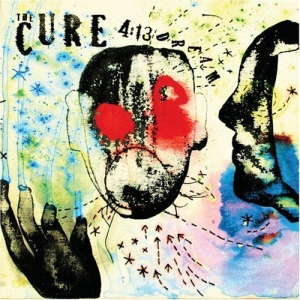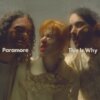For Ten Days of the Cure we revisit Fliss Collier’s review of The Cure’s last album around the time of its release.
This is the hardest review I have ever had to write. I’ve been a Cure fan for half of my life. I’ve never turned my back on the band’s music. When stalwart fans of greater age and experience have taken issue with The Cure’s latter efforts (see the Valentine’s day 2000 massacre of Bloodflowers, or the fearsome weird pop debacle that some perceive Wild Mood Swings to be), I have found worth and cause for continued allegiance, and wondered what the fans’ problem was, frankly. With 4:13 Dream, it feels different.
4:13 Dream is not a far cry from 2004’s eponymous album (did anyone buy that in the UK? Rhetorical question, it just feels so forgotten). But it fails to match the more melodic nuances, many of the songs are instantly forgettable.
The new album’s opening track Underneath the Stars glisters in the same twinkling ambience of Disintegration, as if striving to recapture the latter’s essence (and success). The early stint of the album is quite a delight, with the sunny lullaby of The Only One acting as a welcome stark contrast to the more moody opener, followed by the heady pretty The Reasons Why. Unfortunately after this triptych the album heads on course to fall flat. Freakshow is jazzy and funky in the worst notions of those words, Siren Song is so understated it’s barely evident (and scores of The Cure’s b-sides cast gargantuan shadows on it), and The Real Snow White is a real stinker, dully droning on, and even going so far as using the refrain Hey ho a la the seven dwarves themselves. And don’t get me started on Sleep When I’m Dead which isn’t fit to lick the Doctor Marten boots of even the most dreadful songs from 1987’s Kiss me Kiss me Kiss me album, despite being written around that time and bearing all the generic low grind guitar menace, agitated vocals, and middle eastern jangle.
For the tuned in Cure fan, this album bears dozens of minute hallmarks of previous works, including various fashions of Robert Smith yelps, sighs, groans, and whispered enunciations, guitar howls (see the Wish era style The Hungry Ghost), driving grinding bass (again from the Wish canon), and ditsy pop sensibilities that would sit seamlessly on the previous album. However much I try not to be conscious of it, I cannot help but feel that this is at times Cure by numbers. There’s previously accomplished tokens galore – wistfully sad romantic one about a girl (check: The Perfect Boy), existential angst one (check: Switch with its sick of being alone with myself sentiments), self-destructive whiny appalled-at-the-world album closer declaring that everything is over (check: erm, It’s Over).
Above all, my concern and disappointments lie in the lack of emotive affecting at bay. I don’t feel moved to tears or yearning once, and that’s a first for any Cure album in their cannon that I’ve heard. Things feel used up, recycled, forced. The newer fans might lap this up in wide-eyed buy-it-all obsessive glee, but this long-term fan just feels a tad weary. With all his wild world-wide music influences, profound literary inspiration, and indisputably inimitably distinct take on the world (akin to the Romantic poets of yore), I just want something more than this.
What we have here is the easy route, cutting loose on well established ground and doing it comfortably complacently rather than comfortably well. Personally, I noticed the change come about when the band switched from their life-long record label Fiction (founded by the manager of The Jam, Chris Parry) to the American label Geffen, a comparable market monster. And I can’t help but be led to believe that it’s a case of The Cure chasing the American dollar. The band are far bigger over there than their native UK, and have really been making waves this decade, mainly in the teenage market who are starry eyed in the face of The Cure as if they were a brand new 20-something band. Couple this with the fact that The Cure have been reluctant to tour their homeland UK properly or often (odd London one-offs after 1996 when full-scale nationwide tours were once common) and we realise we have a Cure with far more vested interest in US success and acceptance. However, it’s interesting to note that the UK’s NME has suddenly put The Cure on the front cover of their magazine – for the first time in, correct me if I’m wrong, 16 years. And the band have only just – in three decades of making music – won the ‘Godlike Genius’ award from NME (should be at least a Brit Award), and are to play a massive gig in London next year in the honour of winning the award. So it all just screams of crass cash-in to me, and I’m sorely disappointed that Robert Smith is not as questioning and principled as I perceived he once was. Crucially though, it’s the music, something has truly been lost along the way here. But it will sell in bucket loads in the US because the buzz is there, and the timing ripe.




